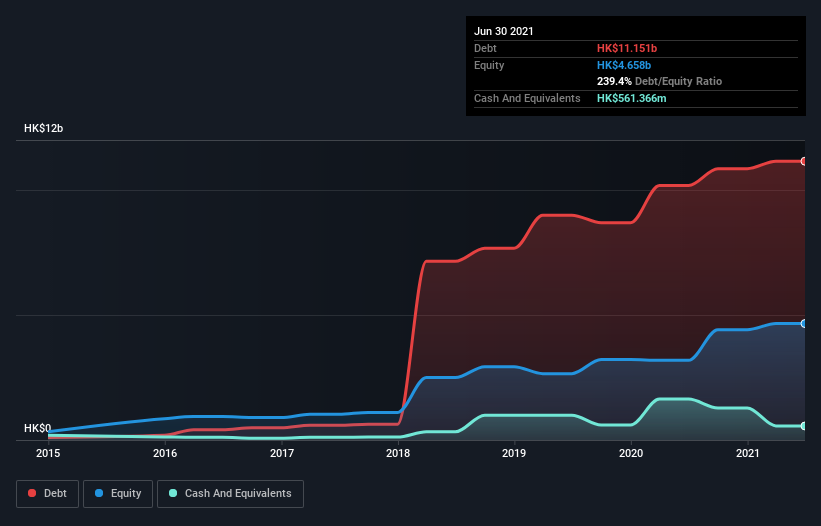- Hong Kong
- /
- Trade Distributors
- /
- SEHK:1196
Realord Group Holdings (HKG:1196) Is Making Moderate Use Of Debt

David Iben put it well when he said, 'Volatility is not a risk we care about. What we care about is avoiding the permanent loss of capital.' So it might be obvious that you need to consider debt, when you think about how risky any given stock is, because too much debt can sink a company. Importantly, Realord Group Holdings Limited (HKG:1196) does carry debt. But should shareholders be worried about its use of debt?
What Risk Does Debt Bring?
Debt assists a business until the business has trouble paying it off, either with new capital or with free cash flow. Part and parcel of capitalism is the process of 'creative destruction' where failed businesses are mercilessly liquidated by their bankers. However, a more usual (but still expensive) situation is where a company must dilute shareholders at a cheap share price simply to get debt under control. Having said that, the most common situation is where a company manages its debt reasonably well - and to its own advantage. When we think about a company's use of debt, we first look at cash and debt together.
Check out our latest analysis for Realord Group Holdings
How Much Debt Does Realord Group Holdings Carry?
As you can see below, at the end of June 2021, Realord Group Holdings had HK$11.2b of debt, up from HK$10.2b a year ago. Click the image for more detail. However, it does have HK$561.4m in cash offsetting this, leading to net debt of about HK$10.6b.

A Look At Realord Group Holdings' Liabilities
We can see from the most recent balance sheet that Realord Group Holdings had liabilities of HK$1.10b falling due within a year, and liabilities of HK$11.8b due beyond that. Offsetting this, it had HK$561.4m in cash and HK$607.0m in receivables that were due within 12 months. So it has liabilities totalling HK$11.7b more than its cash and near-term receivables, combined.
This is a mountain of leverage relative to its market capitalization of HK$14.9b. This suggests shareholders would be heavily diluted if the company needed to shore up its balance sheet in a hurry. There's no doubt that we learn most about debt from the balance sheet. But you can't view debt in total isolation; since Realord Group Holdings will need earnings to service that debt. So when considering debt, it's definitely worth looking at the earnings trend. Click here for an interactive snapshot.
Over 12 months, Realord Group Holdings reported revenue of HK$1.0b, which is a gain of 38%, although it did not report any earnings before interest and tax. Shareholders probably have their fingers crossed that it can grow its way to profits.
Caveat Emptor
Despite the top line growth, Realord Group Holdings still had an earnings before interest and tax (EBIT) loss over the last year. To be specific the EBIT loss came in at HK$45m. When we look at that and recall the liabilities on its balance sheet, relative to cash, it seems unwise to us for the company to have any debt. So we think its balance sheet is a little strained, though not beyond repair. However, it doesn't help that it burned through HK$121m of cash over the last year. So suffice it to say we do consider the stock to be risky. When analysing debt levels, the balance sheet is the obvious place to start. However, not all investment risk resides within the balance sheet - far from it. For example, we've discovered 2 warning signs for Realord Group Holdings (1 is significant!) that you should be aware of before investing here.
If you're interested in investing in businesses that can grow profits without the burden of debt, then check out this free list of growing businesses that have net cash on the balance sheet.
If you're looking to trade Realord Group Holdings, open an account with the lowest-cost platform trusted by professionals, Interactive Brokers.
With clients in over 200 countries and territories, and access to 160 markets, IBKR lets you trade stocks, options, futures, forex, bonds and funds from a single integrated account.
Enjoy no hidden fees, no account minimums, and FX conversion rates as low as 0.03%, far better than what most brokers offer.
Sponsored ContentNew: AI Stock Screener & Alerts
Our new AI Stock Screener scans the market every day to uncover opportunities.
• Dividend Powerhouses (3%+ Yield)
• Undervalued Small Caps with Insider Buying
• High growth Tech and AI Companies
Or build your own from over 50 metrics.
This article by Simply Wall St is general in nature. We provide commentary based on historical data and analyst forecasts only using an unbiased methodology and our articles are not intended to be financial advice. It does not constitute a recommendation to buy or sell any stock, and does not take account of your objectives, or your financial situation. We aim to bring you long-term focused analysis driven by fundamental data. Note that our analysis may not factor in the latest price-sensitive company announcements or qualitative material. Simply Wall St has no position in any stocks mentioned.
Have feedback on this article? Concerned about the content? Get in touch with us directly. Alternatively, email editorial-team (at) simplywallst.com.
About SEHK:1196
Realord Group Holdings
An investment holding company, engages in the commercial printing, hangtag, motor vehicles parts, financial service, trading, property, and environmental protection businesses in Hong Kong, Mainland China, Grenada, Japan, and internationally.
Imperfect balance sheet very low.
Market Insights
Community Narratives



